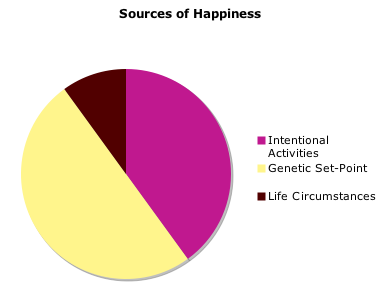Note: I’m not sold on this theory. More on that later, but for now, this is how the theory of the happiness formula is commonly explained.
What your instincts tell you about how to be happier is probably wrong. Most people try to change their happiness by changing their circumstances. The logic is, by changing their life situation to one they are happier with – more money, better house, different gender, whatever – they’ll become happier because they like the new situation more. This true to a certain extent, but is basically misguided.
The happiness you experience comes from three sources; your genetics, your life circumstances, and your intentional activities, split like this:

So the ‘happiness formula’ is this:
Happiness = Genetic Set Point + Life Circumstances + Intentional Activities
According to this model, life circumstances account for only 10% of your happiness, genetics account for 50%, and intentional activities account for 40%. Intentional activities are the ways we act, think about, and respond to the world. In other words, the same life circumstance has the potential to cause different amounts of happiness in people depending on how they react to it. There are certain ways of thinking and behaving that cause people to respond to events with more negative emotions, and likewise, there are ways of thinking and behaving that cause people to respond with more positive emotion.
While there is some debate about the specifics of this model, one thing is well accepted – if you want to be happier, the best way is to focus on changing your intentional activities. You can’t change your genetics, and circumstances seem to have a smaller effect. Of course, if your circumstances are particularly bad; if you’re in an abusive relationship, if you’re homeless, if you’ve recently been incarcerated – your circumstances will have a stronger effect on your emotions. But it’s not possible for me describe the way out of every bad situation every reader of this might find themselves in. Everyone can change their intentional activities, though.
Why would circumstances count for so little? It might seem backwards, but it makes more sense when you add in the concept of hedonic adaptation, which we learned about earlier in this chapter. Many things give us a boost in happiness, but we adapt to them over time, and the happiness wears off. Circumstances are more long-standing. Intentional activities are either short-term (giving no time to adapt), change how we react to circumstances, or they make changes to the brain such that it brings more positive emotion and less negative emotion.
Let’s try an example. Take marriage. Marriage is long-term, and seems to make most people happier for a few years, before they adapt to it. But expressing gratitude to each other, having those awful picnic things where you feed each other food (yuck!), savouring the good times, talking about all the other disgustingly romantic things you did together; these things boost happiness, but as they are episodic there’s no adaptation to them. You just have to keep doing different activities.